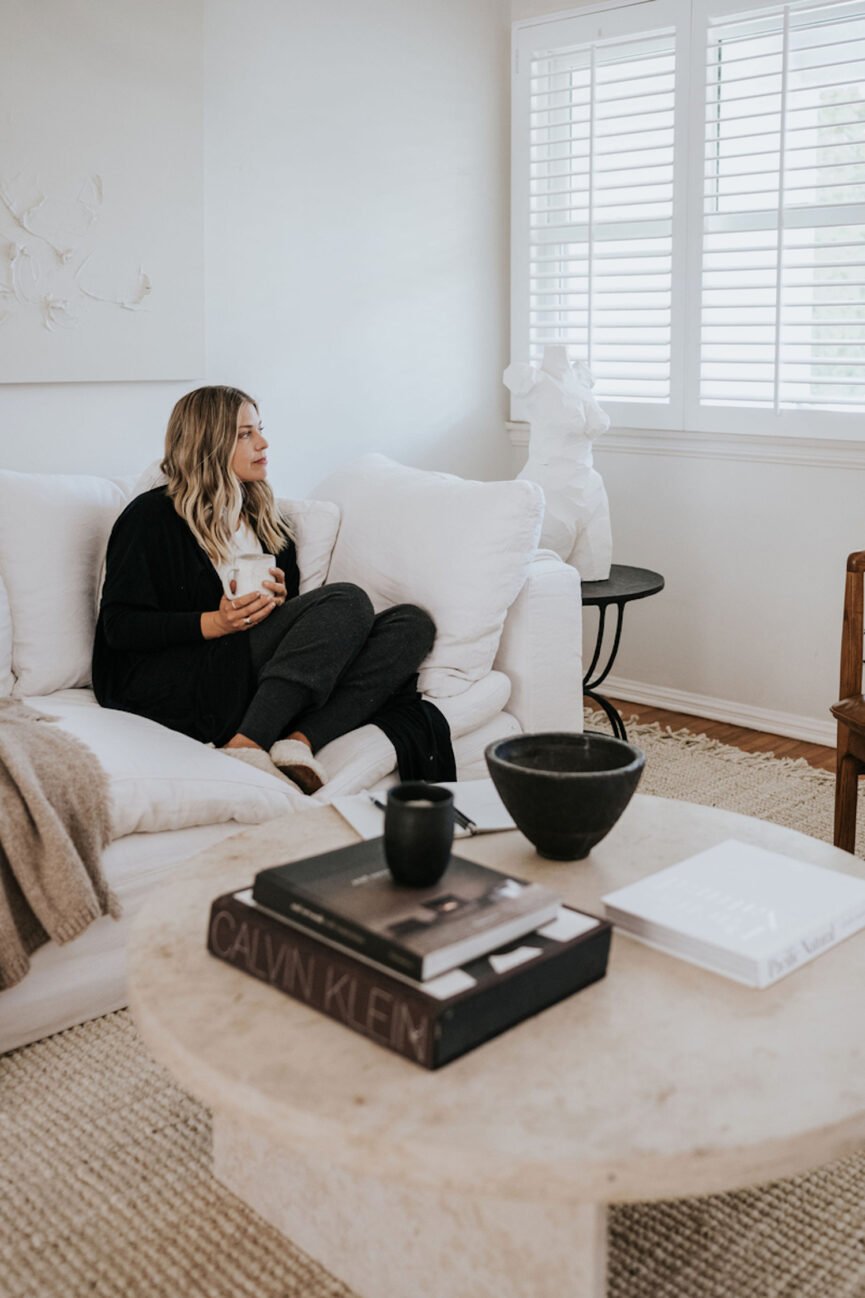Spring is months away, and yetâI’ve been obsessed with decluttering. My physical space has seen the brunt of my efforts, with closet clean-outs, book donations, and questions of “Does this spark joy?” dominating my weekends. And as gratifying as the efforts have been, I’ve realized that what’s really holding me back is the clutter taking up precious space in my mind. This realization led me to explore the concept of psychological minimalismâa practice of simplifying thoughts, emotions, and mental habits to create space for clarity and purpose. By focusing on decluttering my internal world, Iâve started to uncover a sense of peace that even the tidiest home canât replicate.
Of course, practicing psychological minimalism in todayâs fast-paced, hyperconnected world feels like an uphill battle. Notifications buzz, inboxes overflow, and the endless scroll of social media competes for every spare moment of our attention. How can we possibly quiet our minds when so much demands to be heard? The truth is, it isnât easyâand for many, myself included, it requires rethinking and rebuilding the way we approach our days. But the reward is worth it. By focusing on what truly mattersâboth externally and internallyâwe can cut through the noise, uncover a greater sense of clarity, and live with intention. Hereâs how to embrace psychological minimalism and the transformative shifts it brings.

What is psychological minimalism?
I recently finished Eileen by Ottessa Moshfegh, and one passage in particular stuck with me:
âHere is how I spend my days now. I live in a beautiful place. I sleep in a beautiful bed. I eat beautiful food. I go for walks through beautiful places. I care for people deeply. At night my bed is full of love, because I alone am in it. I cry easily, from pain and pleasure, and I donât apologize for that. In the mornings I step outside and Iâm thankful for another day.â
In these words, Moshfegh paints a life immersed in simplicity and meaning, where beauty, gratitude, and care guide each day. As I wrote on my Substack, her solitude isnât lonely; itâs abundantâa self-sufficiency that begins within. She reframes fulfillment as something rooted in the present moment, unburdened by the need for external validation. For me, this is the essence of psychological minimalism: living with intention by clearing away the mental and emotional clutter that distracts us from what truly matters.
Psychological minimalism is the practice of simplifying your inner world. While physical minimalism often calls to mind clean countertops or neatly organized closets, its mental counterpart focuses on paring down thoughts, habits, and commitments that donât serve you. It’s about identifying what weighs you downâwhether itâs a never-ending to-do list, the constant scroll of social media, or overcommitting to other peopleâs expectationsâand learning to let it go.
At its core, psychological minimalism isnât about isolation or shutting yourself off from the world. Instead, itâs about focusing your attention and energy on the things that bring clarity, joy, and connection. It’s a mindset shift that creates space for gratitude, presence, and peace. Much like the life Moshfeghâs character describes, psychological minimalism allows you to live authentically in a way that feels abundant and free.
The Impact of Mental Clutter
Mental clutter can feel inescapable. The constant barrage of information creates a baseline of distraction that pulls our attention in countless directions. It often feels like my mind is a browser with too many tabs openâeach one demanding immediate action. And itâs not just me: studies show that the average person checks their phone over 100 times a day, and a 2022 global Ipsos survey showed that nearly 60% of people report feeling overwhelmed by the demands of work and life. The result? Focus and productivity take a hit, and instead of moving through the day with purpose, weâre left reacting to whatever asks for our attention next.
This constant mental noise doesnât just impact our efficiencyâitâs a direct path to burnout. When our minds are crowded with commitments, worries, and distractions, it becomes harder to prioritize what truly matters. Iâve noticed that on my busiest days, when my to-do list feels endless and notifications pull me away from one task to the next, I end up accomplishing less than I hoped. Bonus: I feel drained by the end of it. Over time, this accumulation of unprocessed thoughts and unmet expectations creates a persistent sense of overwhelm. By recognizing this pattern, Iâve learned that clearing mental clutter isnât just a nice idea. It’s essential for reclaiming our focus, energy, and well-being.
The Benefits of Psychological Minimalism
Psychological minimalism offers a transformative shift in how we live and think. By reducing mental noise, we can experience enhanced focus and mental clarity, allowing us to channel energy toward our goals. The practice also reduces stress and anxiety by simplifying mental and emotional clutter, helping us create a calm and peaceful internal state?.
One of the most significant benefits of psychological minimalism is its ability to align actions with personal values. When mental clarity improves, so does our capacity for intentional decision-making, helping us prioritize what matters most. This brings a sense of purpose and satisfaction, creating space for more meaningful connections and experiences.
How to Practice Psychological Minimalism
Step 1: Identify Your Mental Clutter
Begin by identifying the sources of mental clutter. These are the thoughts, worries, commitments, and obligations that regularly occupy your mind, leaving you feeling drained or overwhelmed. Take time to reflect on recurring stressors, whether it’s unfinished tasks, unresolved concerns, or emotional baggage.
Journaling can be a helpful exercise. Create a âmental clutter inventoryâ to take stock of whatâs weighing on you. By recognizing these distractions, you can begin the process of decluttering your mind, just as you would declutter your physical space.
Read more: How to Start a Journaling Practice You Can Actually Stick To
Step 2: Set Boundaries for Your Attention
In a world filled with endless notifications and constant distractions, itâs crucial to set clear boundaries for your attention. Start by limiting notifications on your phone and social media apps, reducing screen time, and designating specific times of day to check email or social media. Practicing the art of not responding to every message immediately can help you reclaim your focus and prevent mental clutter from accumulating. Embrace the idea that not everything requires an instant response, and that taking control of your attention is a key part of psychological minimalism. This boundary-setting allows you to direct your energy to whatâs truly important, reducing feelings of overwhelm.
Read more: Email Anxiety? A Psychologist Shares Her Top Tips for Moving Past It
Step 3: Focus on What Truly Matters
A critical aspect of psychological minimalism is learning to focus on what truly matters in your life. Start by identifying your core valuesâthose principles that resonate deeply with who you are and what you want to create in the world. Once these values are clear, use them as a guide to make decisions and prioritize your time. A helpful tool in this process is creating a personal mission statement or a daily âfocus listâ that serves as a reminder of your most important goals and responsibilities. By staying aligned with your values, you can make more intentional decisions and avoid getting distracted by non-essential tasks that only add to your mental clutter.
Step 4: Let Go of Mental Habits That Donât Serve You
Much of the mental clutter we experience stems from ingrained habits and thought patterns that no longer serve us. Mindfulness can be a powerful tool in breaking free from these unproductive cycles. By practicing mindfulness, you become more aware of your thoughts and are better able to catch and release those that are negative, repetitive, or distracting. Developing routines that minimize decision fatigueâsuch as meal prepping, scheduling your day in advance, or sticking to a morning ritualâcan also reduce mental clutter and create a sense of structure. These habits help you conserve mental energy and reduce stress, making room for more clarity and focus.
Read more: Ditch These 5 Unhealthy Habits to Unlock Your Best Life
Step 5: Embrace Stillness and Downtime
Finally, psychological minimalism encourages you to embrace stillness and downtime as integral parts of a balanced life. In a culture that often equates productivity with busyness, it can be difficult to recognize the value of rest. Yet, quiet moments of introspection and relaxation are crucial for mental health and creativity. Activities like meditation, mindful walks, or simply sitting in silence without the distractions of devices can nurture a sense of peace and clarity. Reframe rest not as idle time, but as an essential practice for your well-being. By integrating these practices into your routine, you allow your mind the space to recharge and reset, ultimately fostering greater mental clarity and a more meaningful life.
Read more: 7 Creative Ideas To Help You Make the Most of Your Downtime
Embrace a Clearer, More Intentional Life
Psychological minimalism isn’t just about clearing physical clutterâit’s about intentionally creating mental and emotional space that allows you to live with greater clarity, peace, and purpose. By identifying the mental clutter that weighs on you, setting boundaries for your attention, and focusing on what truly matters, you can cultivate a mindset that aligns with your values.
Take the first step today by reflecting on your own mental clutter. What thoughts or commitments are you holding onto that no longer serve you? By recognizing these sources of noise, you can begin to declutter your mind and free up space for what truly matters. Imagine how your life could transform if you made room for a quieter, more intentional mindâone thatâs able to focus on whatâs important, reduce anxiety, and foster a sense of calm and purpose. The journey toward psychological minimalism starts with a single thought: that you deserve the peace to live your best life.

